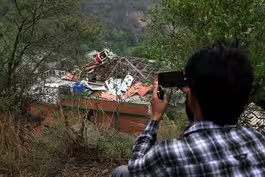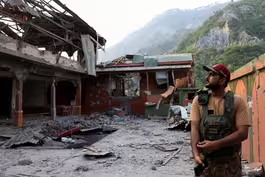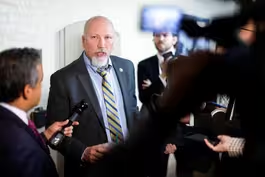
Examining Trump's latest hardline immigration policies
Clip: 5/7/2025 | 6m 22sVideo has Closed Captions
Examining Trump's latest hardline immigration policies and legal battles around them
To increase its deportation numbers, the Trump administration is planning to send immigrants to Libya on U.S. military planes. That’s according to multiple reports citing unnamed officials. But when asked about it in the Oval Office, President Trump didn’t seem to know what his administration was planning. White House correspondent Laura Barrón-López reports on the president’s deportation agenda.
Problems playing video? | Closed Captioning Feedback
Problems playing video? | Closed Captioning Feedback
Major corporate funding for the PBS News Hour is provided by BDO, BNSF, Consumer Cellular, American Cruise Lines, and Raymond James. Funding for the PBS NewsHour Weekend is provided by...

Examining Trump's latest hardline immigration policies
Clip: 5/7/2025 | 6m 22sVideo has Closed Captions
To increase its deportation numbers, the Trump administration is planning to send immigrants to Libya on U.S. military planes. That’s according to multiple reports citing unnamed officials. But when asked about it in the Oval Office, President Trump didn’t seem to know what his administration was planning. White House correspondent Laura Barrón-López reports on the president’s deportation agenda.
Problems playing video? | Closed Captioning Feedback
How to Watch PBS News Hour
PBS News Hour is available to stream on pbs.org and the free PBS App, available on iPhone, Apple TV, Android TV, Android smartphones, Amazon Fire TV, Amazon Fire Tablet, Roku, Samsung Smart TV, and Vizio.
Providing Support for PBS.org
Learn Moreabout PBS online sponsorshipAMNA NAWAZ: In an effort to increase its deportation numbers, the Trump administration is planning to deport immigrants to Libya on U.S. military planes as soon as today.
That's according to multiple reports citing unnamed U.S. officials.
But when asked about it in the Oval Office today, President Trump didn't seem to know what his administration was planning.
QUESTION: Is the administration sending migrants to Libya?
DONALD TRUMP, President of the United States: I don't know.
You will have to ask Homeland Security, please.
AMNA NAWAZ: Our White House correspondent, Laura Barron-Lopez, joins me now for the latest on the president's deportation agenda.
Good to see you, Laura.
LAURA BARRON-LOPEZ: Good to be here.
AMNA NAWAZ: So what else do we know about these possible migrant flights to Libya?
LAURA BARRON-LOPEZ: We don't know much more, Amna, that because of the fact that the administration is not answering basic questions.
We reached out to Homeland Security, as the president referred to.
We reached out to the White House.
And they didn't answer any questions when we asked which undocumented migrants would be deported, when and whether or not it was to Libya or to other countries.
The State Department simply said that they do not discuss details of diplomatic conversations with other governments, despite the fact that the secretary of state, Marco Rubio, has repeatedly said that they are looking for other countries to deport undocumented migrants to.
Now, we should note that Libya's two rival governments, that's the Western internationally recognized government,as well as the Eastern militia government, both rejected any existence of an agreement or talks of any kind of agreement to deport migrants to Libya.
And just hours ago, a federal judge in Massachusetts restricted the president's ability to deport migrants to Libya, saying that doing so would clearly violate prior orders that he has made.
AMNA NAWAZ: We should note the conditions in these prisons in Libya is well-documented.
What would migrants face if they're deported there?
LAURA BARRON-LOPEZ: A recent State Department report on human rights practices in Libya found that there is no access to immigration courts or due process for those that are housed in detention centers there.
And I spoke to Frederic Wehrey.
He is a senior fellow at the Carnegie Endowment of International Peace who has actually visited several of these migrant detention facilities, and he detailed those conditions.
FREDERIC WEHREY, Carnegie Endowment for International Peace: It's a whole litany of horrors, I mean, obviously, overcrowding.
When you first walk in, you're immediately overwhelmed by the sheer mass of humanity that's stuffed inside these narrow, windowless confines, obviously severe sanitation problems, routine beatings.
The prison guards admitted to me that they routinely administer beatings as a matter of practice, sexual violence, malnutrition, all sorts of very visible ailments, infections.
LAURA BARRON-LOPEZ: Frederic Wehrey also said that migrants in Libya are viewed as expendable and that it's a matter of practice that migrants' fates are often horrific and unknown.
AMNA NAWAZ: Meanwhile, Laura, we should note the president's deportation campaign reached Washington, D.C., this week.
There were a number of restaurants in the capital that were targeted.
What's the latest on that front?
LAURA BARRON-LOPEZ: On Tuesday, ICE agents showed up at a number of restaurants across the District, and they were asking for I-9 forms.
Those are to verify the employment eligibility of individuals.
And so far, no -- there were no detentions from those visits that we can report, but immigrant advocates referred to them as attempted raids.
And we're told that more than half-a-dozen of restaurants were targeted.
AMNA NAWAZ: And you spoke to an owner of one of the businesses that was targeted.
What did they tell you?
LAURA BARRON-LOPEZ: I talked to Bo Blair.
He is the owner of Millie's, which is a restaurant in a Northwest D.C. neighborhood.
And he told me that ICE agents showed up on Tuesday.
Some were in uniform.
Some were in plain clothes.
And agents asked to speak to employees.
And they were denied access to those private areas of the restaurant.
And they asked, again, for those I-9 documents, but those are not housed at the restaurant.
They're housed at headquarters.
Bo Blair told me that two of his employees are already too scared to return to work, they did not return to work today, and he's concerned that they may not come back for the rest of the week.
Bo Blair told me that he's worried about the overall chilling effect that this could have on his workers, some who have worked there for 20 to 25 years.
He called it -- quote -- "a whole new level of harassment" of his law-abiding employees and said that without immigrants there are no restaurants, that they are key to that industry.
Now, we also spoke to George Escobar.
He works with the immigration advocacy group CASA, and he said that they are giving a lot of different advice to both businesses, as well as individuals, on how to handle these ICE visits.
GEORGE ESCOBAR, CASA: Have private areas where only the workers or where only the owners may enter, right?
Those private areas, nobody, even law enforcement, can have access to unless they present a warrant, right?
And even at that point, even after they present a warrant, the warrant signed by a judge has to be pretty specific about what types of information is subject to the warrant, what types of information that individual has to turn over.
LAURA BARRON-LOPEZ: Earlier, I said they're giving different advice.
I should have said that they're giving similar to -- advice to both small businesses and individuals about their rights.
Now, ICE agents also told the Millie's owner, Bob Blair, that they are going to return some time early next week.
AMNA NAWAZ: Meanwhile, Laura, related news, there are developments this week on the Alien Enemies Act.
Multiple judges have ruled against the president on this.
What did they say and what happens next?
LAURA BARRON-LOPEZ: In the last two days, two federal judges in New York and in Colorado ruled that the president's use of the Alien Enemies Act exceeds his authority under that law.
So, to date, that means three federal courts have essentially said that the president's use of that act is unlawful.
Now, we should also note that this evening, another federal judge, James Boasberg, held a hearing on whether or not the government needs to facilitate the return of not just Kilmar Abrego Garcia, but all Venezuelans that were deported to El Salvador under the use of that Alien Enemies Act.
Now, we do not expect a ruling in that case until at the earliest some time next week.
AMNA NAWAZ: All right, that's our White House correspondent, Laura Barron-Lopez, with the very latest for us.
Laura, thank you.
A look at difficult issues the next pope will face
Video has Closed Captions
Clip: 5/7/2025 | 8m 11s | As the conclave begins, a look at difficult issues the next pope will face (8m 11s)
Pakistan calls Indian strikes an act of war, vows to respond
Video has Closed Captions
Clip: 5/7/2025 | 3m 8s | Pakistan calls Indian strikes an 'act of war' and vows to respond (3m 8s)
Pakistani ambassador, Indian advisor share views on attacks
Video has Closed Captions
Clip: 5/7/2025 | 10m 54s | Pakistani ambassador, Indian advisor share perspectives on recent attacks and retaliation (10m 54s)
Rep. Chip Roy: GOP leaders need to 'show us the math'
Video has Closed Captions
Clip: 5/7/2025 | 6m 26s | Rep. Chip Roy says GOP leaders need to 'show us the math' in tax cut, Medicaid talks (6m 26s)
Social network brings people together in divisive times
Video has Closed Captions
Clip: 5/7/2025 | 9m 56s | How a social network is bringing people together in increasingly divisive times (9m 56s)
Providing Support for PBS.org
Learn Moreabout PBS online sponsorship
- News and Public Affairs

FRONTLINE is investigative journalism that questions, explains and changes our world.

- News and Public Affairs

Amanpour and Company features conversations with leaders and decision makers.












Support for PBS provided by:
Major corporate funding for the PBS News Hour is provided by BDO, BNSF, Consumer Cellular, American Cruise Lines, and Raymond James. Funding for the PBS NewsHour Weekend is provided by...





